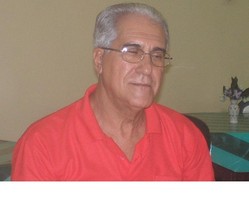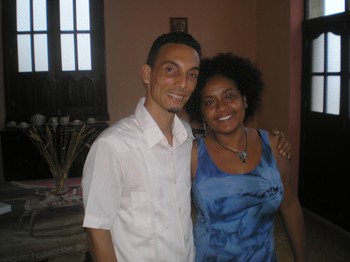Some 40 years ago, the Rev. Raimundo Garcia Franco, a Presbyterian pastor here, saw a need and began thinking about how to meet it. The result of his ponderings, an inviting and well-maintained facility called the Christian Center for Reflection and Dialogue, now serves as a launching pad for projects designed to improve the lives of ordinary Cubans.
The center is not just another think tank but a breeding ground for creative ideas that can be turned into concrete actions. Laypersons as well as pastors from various denominations attend programs at the center and emerge equipped to grapple with pressing social needs.
“If we are not part of the solution, then we are part of the problem,” proclaims a slogan prominently posted beside the entrance to the center as well as in the lobby.
Support for people with disabilities, meals for elderly people and counseling for families in crisis are among the solutions that have grown out of center discussions. Conversations about caring for the environment have spawned the development of a biofuel project that recycles animal waste into energy and fertilizer.
At a center-affiliated farm seven kilometers from downtown Cardenas, farmers learn about organic agriculture and the ecological breeding of animals, developing skills that enable them to better support their families.
The center encourages theological reflection and dialogue about divisive issues — but always with a practical dimension. Pedro González Delgado, the center’s projects coordinator, says the goal of dialogue is “to think in a different way in order to resolve conflicts.”

Pedro González Delgado, projects coordinator for the Christian Center for Reflection and Dialogue —Jerry L. Van Marter
Ironically, the center facilities in Cardenas are located just down the street from the home of Elian Gonzalas, whose forcible return to his father in Cuba in 2000 exposed deep divisions within the boy’s family and between Cubans living on the island and in the United States. Elian’s father in Cuba won a court battle for custody of the child, who had been staying with relatives in Miami after his mother perished at sea while fleeing Cuba with her son.
The seeds for today’s sophisticated lineup of center programs were planted decades ago at John G. Hall Presbyterian Church, named for its founder, a Presbyterian missionary. Franco, the congregation’s pastor at the time, began getting people together at the church to talk about how to solve various problems in the society.
The center was formally organized 22 years ago following the Cuban government’s lifting of restrictions on religious activities. Two years ago, the government granted the center official recognition as a religious institution.
Franco, now 72, is still a fixture at the center. The Rev. Alison Infante Zamora, current pastor of the 102-member John G. Hall congregation, says he and other Cardenas Presbyterians are very involved in the center’s activities. Center director Rita Maria Garcia Morris is an elder at John G. Hall Church. Zamora and other pastors are frequently invited to preach at the center.
Center facilities include 70 guest rooms to house visiting groups. The Presbyterian Church (U.S.A.)’s Hunger Program used the guest quarters for a meeting several years ago. Financial support for center activities comes from partner churches and organizations in Canada and Western Europe.
The center was among the first venues in Cuba to host conversations about social realities such as religious persecution, child abuse, gender issues and the needs of people with disabilities. Such conversations continue today, guided by a mandate that appears in the center’s logo:
“Put all things to the test. Keep what is good.”
Eva Stimson, former editor of Presbyterians Today magazine, is a freelance writer and editor.

